List of historical markers of the Philippines overseas

This list of historical markers installed by the National Historical Commission of the Philippines (NHCP) outside the Philippines is an annotated list of people, places, or events in the region that have been commemorated by cast-iron plaques issued by the said commission. The plaques themselves are permanent signs installed in publicly visible locations on buildings, monuments, or in special locations. Many markers outside the country have been written in the local languages such as French, German, and Spanish.
The Kudan, the Philippine embassy building in Tokyo, has been declared a national historical landmark by the NHCP and was granted a historical marker on March 3, 2014. It is the first and currently the only overseas site to be granted such status.[1] During the unveiling of the marker, Ambassador Manuel Lopez called the building as the crown jewel of Philippine foreign service.[2]
This article lists forty (40) markers outside the Philippines.
Overseas markers
[edit]| Marker title | English Translation | Category | Type | Description | Location | Language | Date Issued | Image |
|---|---|---|---|---|---|---|---|---|
| Apolinario Mabini (1854–1903) |
Structure | Banished to Guam from 1901 with other Filipino political prisoners who are against the American rule. | Asan Point, Guam, United States | English | 1964 | 
| ||
| Apolinario Mabini (1854–1903) |
Banished to Guam from 1901 with other Filipino political prisoners who are against the American rule. | Guam, United States | English | |||||
| The Arrival of Filipino Plantation Workers in Hawaii | They arrived on December 20, 1906. They were fifteen who came from Ilocos and the pioneer Filipino migrants in Hawaii. | Filipino Community Center, Waipahu, Hawaii, United States | English | September 16, 2006 | 
| |||
| Dr. Jose Rizal[3] | Acapulco, Mexico | January 11, 1998 | ||||||
| Dr. Jose Rizal | Where Rizal studied the local educational system and where he got famous for being an oculist. | Hong Kong, China | English | |||||
| Dr. Jose Rizal | Where Rizal began his annotation of Antonio de Morga's Sucesos de las Islas Filipinas. | London, United Kingdom | English | |||||
| Dr. Jose Rizal | Madrid, Spain | Spanish | ||||||
| Plaque commémorative | Ici séjourna en juin 1883 José Rizal (1861-1896), héros national philippin, écrivain médecin. À l'occasion du centenare de sa mort le 30 décembre 1896. | 37 rue de Maubeuge, 9th arrondissement, Paris, France | French | December 30, 1996 | 
| |||
| Dr. Jose Rizal | Where Rizal lived in Paris and wrote the first chapter of Noli Me Tángere. | 45 rue de Maubeuge, 9th arrondissement, Paris, France | English | |||||
| Dr. Jose Rizal (1861–1896) | National hero of the Philippines, visited Chicago on May 11, 1888. | Filipino American Council of Chicago, Chicago, United States | English | 1993 | ||||
| Dr. Jose Rizal (1861–1896)[4] | National hero of the Philippines, where Rizal stayed in Vienna. | Leopold Hof Building, Vienna, Austria | German | June 19, 1995 | 
| |||
| Dr. Jose Rizal (1861–1896) | National hero of the Philippines, where he completed Noli Me Tángere. | Jägerstraße, Berlin, Germany | German | 2003 | 
| |||
| Embahada ng Pilipinas Fujimi, Chiyoda-Ku, Tokyo |
Embassy of the Philippines Fujimi, Chiyoda-Ku, Tokyo |
Declared as a national historical landmark by the NHCP. | Chiyoda-ku, Tōkyō, Japan | Filipino,
A Japanese translation is provided under |
March 3, 2014 | 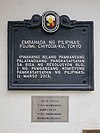
| ||
| Embassy of the Philippines Tokyo |
Building/Structure | Foreign Embassy | Building purchased by Jose P. Laurel for the Philippines. | Chiyoda-ku, Tōkyō, Japan | English | March 9, 1962 | 
| |
| Hommage | Tribute | Commemorating the gathering of Filipino intellectuals and patriots who gathered at the studio of Juan Luna. | Masson Daniel, 65 Boulevard Arago, Paris, France | French | 1987 | 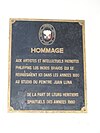
| ||
| Jose P. Laurel[5] | Nara, Japan | March 9, 1969 | ||||||
| Jose Protacio Rizal
(1861-1896) |
National Hero of the Philippines. Martyred on December 30, 1896. | Columbus Drive, Jersey City, New Jersey[6] | English | October 24, 2000 | 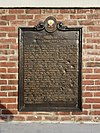
| |||
| Jose Rizal | National Hero of the Philippines. House where he wrote El Filibusterismo. | 42 Rue Philippe de Champagne, Brussels, Belgium | French | 2007 | 
| |||
| Jose Rizal | National hero of the Philippines. The living soul of the Philippine Revolution. | Rosemeadow, Campbelltown, New South Wales, Australia | English | October 26, 2012 | 
| |||
| Jose Rizal | National Hero of the Philippines. Martyred on December 30, 1896. | Cherry Hill, New Jersey, USA | English | November 17, 2018 | ||||
| Jose Rizal (1861–1896)[3] | Brussels, Belgium | June 12, 1998 | ||||||
| Jose Rizal (1861–1896)[3] | Brasilia, Brazil | June 12, 1998 | ||||||
| Jose Rizal (1861–1896)[3] | Havana, Cuba | June 12, 1998 | ||||||
| Jose Rizal (1861–1896)[3] | Madrid, Spain | June 12, 1998 | ||||||
| Jose Rizal (1861–1896)[3] | Ottawa, Canada | June 12, 1998 | ||||||
| Jose Rizal (1861–1896)[3] | Port Moresby, Papua New Guinea | June 12, 1998 | ||||||
| Jose Rizal (1861–1896)[3] | Stockholm, Sweden | June 12, 1998 | ||||||
| Jose Rizal (1861–1896)[3] | Riyadh, Saudi Arabia | June 12, 1998 | ||||||
| Jose Rizal (1861–1896)[3] | Roppongi, Tōkyō, Japan | June 12, 1998 | ||||||
| Jose Rizal (1861–1896)[3] | Vatican | June 12, 1998 | ||||||
| Jose Rizal
(1861–1896) |
National hero of the Philippines. | Carson International Sculpture Garden, 801 E. Carson Street, Carson, California, United States[7] | English | September 29, 2012 | 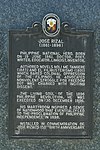
| |||
| Jose Rizal
(1861–1896) |
National hero of the Philippines. | Nose Creek Regional Park, Airdrie, Alberta, Canada | English | June 19, 2022[8] | 
| |||
| Jose Rizal (1861-1896) | Personages | Biographical marker | National hero of the Philippines. | Earl Bales Park, Toronto, Ontario, Canada | English | June 22, 2022 | 
| |
| Jose Rizal 1861-1896 | National hero of the Philippines. | Rizal Monument, Cooper River Park, Camden County, Cherry Hill, New Jersey, USA | English | November 17, 2023[9] | ||||
| José Rizal 1861–1896[10] | National hero of the Philippines, marking the house where Rizal wrote the final parts of Noli Me Tángere. | Wilhelmsfeld, Germany | German | January 4, 1960 | 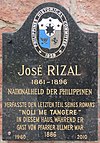
| |||
| José Rizal 1861–1896[11] | National hero of the Philippines, ophthalmology clinic of Rizal in Paris. | 124 rue de Rennes, 6th arrondissement, Paris, France | French | 1959 | 
| |||
| José Rizal
1861–1896 |
National hero of the Philippines, where Rizal lived when he published the Fili. | Henegouwenstraat 9, Ghent, Belgium | French | 1959 | ||||
| Lumang Chancery ng Pasuguan ng Republika ng Pilipinas sa Estados Unidos | Old Chancery of the Embassy of the Republic of the Philippines in the United States | Built under the designs of Appleton Prentis Clark, Jr. Bought by the Philippine Commonwealth through the efforts of Joaquin Elizalde from 1941 to 1946. | Old Philippine Embassy Chancery, 1617 Massachusetts Avenue NW Washington DC, United States | Filipino, English | November 9, 2018 | 
| ||
| Paduka Batara | King of Sulu who died in Dezhou. He travelled to China in 1417 to pay tribute to Emperor Yongle. | Dezhou, China | English | May 23, 1999 | ||||
| Philippine Ambassador's Residence in the United States | Buildings/
Structures |
House | Built by William Lipscomb for General and Charles and Emma Fitzhugh. | 2253 R Street Northwest, Washington D.C., United States | English | June 13, 2022[12] | ||
| The Philippine National Flag | Where the first flag was sewn by Marcela Mariño Agoncillo and her companions Lorenza Agoncillo and Delfina Herbosa Natividad. First hoisted during the Battle of Alapan. | Morrison Hill, Hong Kong, China | May 28, 1998[3] | |||||
| Sewing of the First National Flag[3] | Hong Kong, China | 1998 |
See also
[edit]References
[edit]Footnotes
[edit]- ^ "Envoy's residence in Japan becomes PHL's 1st overseas historical landmark". GMA News Online. Retrieved 2018-01-29.
- ^ "Philippine Ambassador's Official Residence in Tokyo Proclaimed Philippine "National Historical Landmark" | Philippine Embassy – Tokyo, Japan". tokyo.philembassy.net. Retrieved 2018-01-29.
- ^ a b c d e f g h i j k l m National Historical Institute Annual Report 1998. National Historical Institute. 1998.
- ^ http://knightsofrizal.org/?p=268 Did he or didn't he?
- ^ National Historical Commission Annual Report 1968-1969. National Historical Commission. 1969.
- ^ "PHOTOS: 150th birthday of Philippine National Hero Jose Rizal celebrated in Jersey City". NJ.com. Retrieved 2018-02-13.
- ^ "Unveiling for First Monument on Carson's International Sculpture Garden Scheduled for Sept. 29". BakitWhy. September 5, 2012. Retrieved April 20, 2018.
- ^ "Dr. José Rizal statue becomes historical monument". DiscoverAirdrie. Retrieved 2022-06-21.
- ^ "NHCP unveils "Jose Rizal (1861-1896)" historical marker". National Historical Commission of the Philippines.
- ^ http://ufreytag.michel-media.de/page13.html The Wilhelmsfeld Story of José Rizal
- ^ http://xiaochua.net/2013/07/24/xiao-time-18-july-2013-fall-of-the-bastille-ang-pransiya-at-ang-pilipinas/ XIAO TIME, 18 July 2013: FALL OF THE BASTILLE: ANG PRANSIYA AT ANG PILIPINAS
- ^ "Historical Marker Installed at Ambassador's Official Residence in Washington, D.C". dfa.gov.ph. Retrieved 2022-06-21.
Bibliography
[edit]- National Historical Institute (2008). Historical Markers (1992–2006). National Historical Institute.
- A list of sites and structures with historical markers, as of 16 January 2012
- A list of institutions with historical markers, as of 16 January 2012

